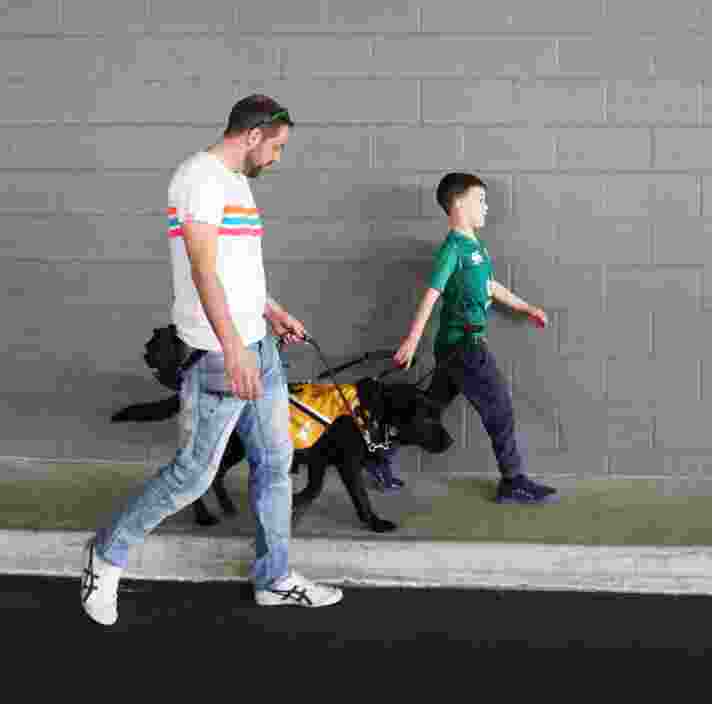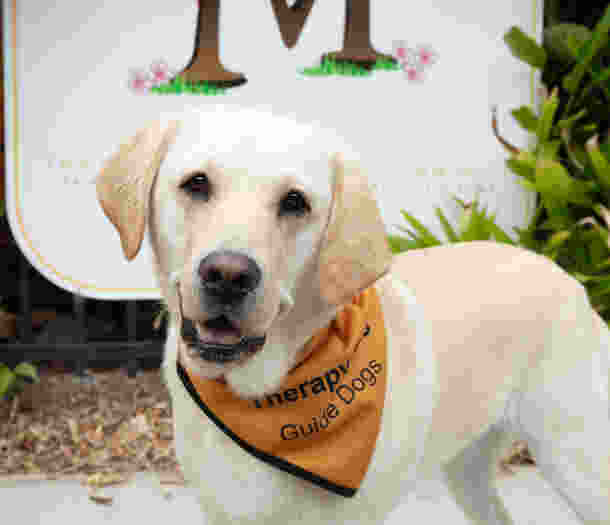On this page:
About the Therapy Dog Program
The Therapy Dog Program is a community focused service that Guide Dogs NSW/ACT have offered for over 30 years.
A Therapy Dog provides comfort, companionship and emotional support to individuals, families, workplaces, schools and facilities. Therapy Dogs can support people who experience:
- behavioural, emotional, developmental and mental health conditions
- physical disabilities
- isolation caused by age or illness
- anxiety and stress in the workplace
- trauma related to critical incidents
We currently offer four Therapy Dog programs. One for individuals and three for facilities, these include Wellbeing Dogs, School Support Dogs and Court Dogs.

Therapy Dogs for individuals
The primary role of a Therapy Dog for an individual is to provide companionship and emotional support for individuals who need it.
Therapy Dogs for facilities
Wellbeing Dogs
These dogs provide mental health support and comfort to emergency services, frontline and healthcare workers and patients. They also provide a comforting presence by lowering anxiety levels for people living in aged care facilities and nursing homes.
Learn more about and apply now for our Wellbeing Dog program
School Support Dogs
These dogs improve the wellbeing of children by lowering anxiety levels and increasing their confidence, as they make the classroom an enjoyable and relaxed space.
Learn more about and apply now for our School Support Dog program.
Court Dogs
These dogs provide comfort and emotional support to court staff and court users in settings like court rooms, remote witness rooms, jury selection and interview rooms.
Learn more about and apply now for our Court Dog program.
Frequently Asked Questions
Therapy Dog FAQs
If after reading the above information you feel you might be a good candidate to receive a dog from our Therapy Dog Program, please complete the expression of interest form below to be sent an email with an information booklet, self-assessment and application.
Our Therapy Dogs are Labradors or Labradors cross Golden Retrievers. We do not offer small breed dogs.
Dogs in the Therapy Dog Program are typically placed with Clients when they are 14-18 months of age.
Unfortunately, no. If you experience allergic reactions to dog hair, please be aware that Labradors and Labrador/Golden Retriever mixes shed a lot of hair, and this may irritate people with allergies to dog hair.
Therapy dogs may assist those with behavioural and mental health conditions, physical disabilities and illness by reducing anxiety, increasing a sense of community, encouraging routine and commitment, and of course, providing unwavering friendship.
Our Therapy dogs are Labradors from our own breeding program that are trained in basic obedience, have great home manners, are reliable on lead, and are exposed to mobility equipment where necessary.
Guide Dogs NSW/ACT relies on the generosity of our donors and supporters to fund the programs and services we provide. To assist with the associated costs of running our programs we request a monetary contribution.
There are fees associated with the Therapy Dog Program. More information will be provided upon submitting an expression of interest.
Enquire now.
We are currently accepting expressions of interest for our Therapy Dog Program for individuals.
Please note, this form is for Individuals expressing interest in applying for a Therapy Dog. If you are applying on behalf of a facility please go to the School Support Dog, Wellbeing Dog or Court Dog pages.
How can I support the Therapy Dog program?
Guide Dogs NSW/ACT is a sponsor, donor and volunteer-driven charity.
As a result, we rely on the generous contributions of our supporters for over 80% of our funding.
Donate now to support the Therapy Dogs program.
You can also become a Puppy Pal, where you can follow the journey of a litter of puppies and donate to help them become life-changing Guide Dogs.
Or if you would like to get involved in a volunteering capacity, apply to become a Puppy Raiser, or explore other volunteering opportunities in your area.

Ready to continue?
Seems like you have filled this form earlier. Let’s pick up where you left off.

